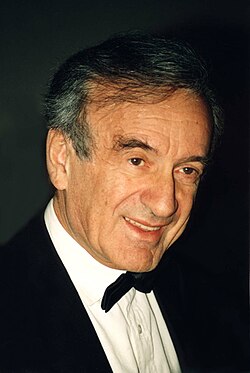Elie Wiesel Quote
The opposite of love is not hate, it's indifference. The opposite of art is not ugliness, it's indifference. The opposite of faith is not heresy, it's indifference. And the opposite of life is not death, it's indifference.
Elie Wiesel
The opposite of love is not hate, it's indifference. The opposite of art is not ugliness, it's indifference. The opposite of faith is not heresy, it's indifference. And the opposite of life is not death, it's indifference.
Related Quotes
Let my silence grow with noise as pregnant mothers grow with life. Let my silence permeate these walls as sunlight permeates a home. Let the silence rise from unwatered graves and craters left by bomb...
Kamand Kojouri
Tags:
abuse, abused, activism, activism poems, activist, amnesty, bellies, bombs, broken hearts, coming together
About Elie Wiesel
Eliezer "Elie" Wiesel (September 30, 1928 – July 2, 2016) was a Romanian-born American writer, professor, political activist, Nobel laureate, and Holocaust survivor. He authored 57 books, written mostly in French and English, including Night, a work based on his experiences as a Jewish prisoner in the Auschwitz and Buchenwald concentration camps.
In his political activities Wiesel became a regular speaker on the subject of the Holocaust and remained a strong defender of human rights during his lifetime. He also advocated for victims of oppression including Soviet and Ethiopian Jews, the apartheid in South Africa, the Bosnian genocide, Sudan, the Kurds and the Armenian genocide, Argentina's Desaparecidos or Nicaragua's Miskito people. He was a strong supporter of the state of Israel and was personally close to Benjamin Netanyahu.
He was a professor of the humanities at Boston University, which created the Elie Wiesel Center for Jewish Studies in his honor. He helped establish the United States Holocaust Memorial Museum in Washington, D.C.
Wiesel received awards including the Nobel Peace Prize in 1986. He was a founding board member of the New York Human Rights Foundation and remained active in it throughout his life.
In his political activities Wiesel became a regular speaker on the subject of the Holocaust and remained a strong defender of human rights during his lifetime. He also advocated for victims of oppression including Soviet and Ethiopian Jews, the apartheid in South Africa, the Bosnian genocide, Sudan, the Kurds and the Armenian genocide, Argentina's Desaparecidos or Nicaragua's Miskito people. He was a strong supporter of the state of Israel and was personally close to Benjamin Netanyahu.
He was a professor of the humanities at Boston University, which created the Elie Wiesel Center for Jewish Studies in his honor. He helped establish the United States Holocaust Memorial Museum in Washington, D.C.
Wiesel received awards including the Nobel Peace Prize in 1986. He was a founding board member of the New York Human Rights Foundation and remained active in it throughout his life.
